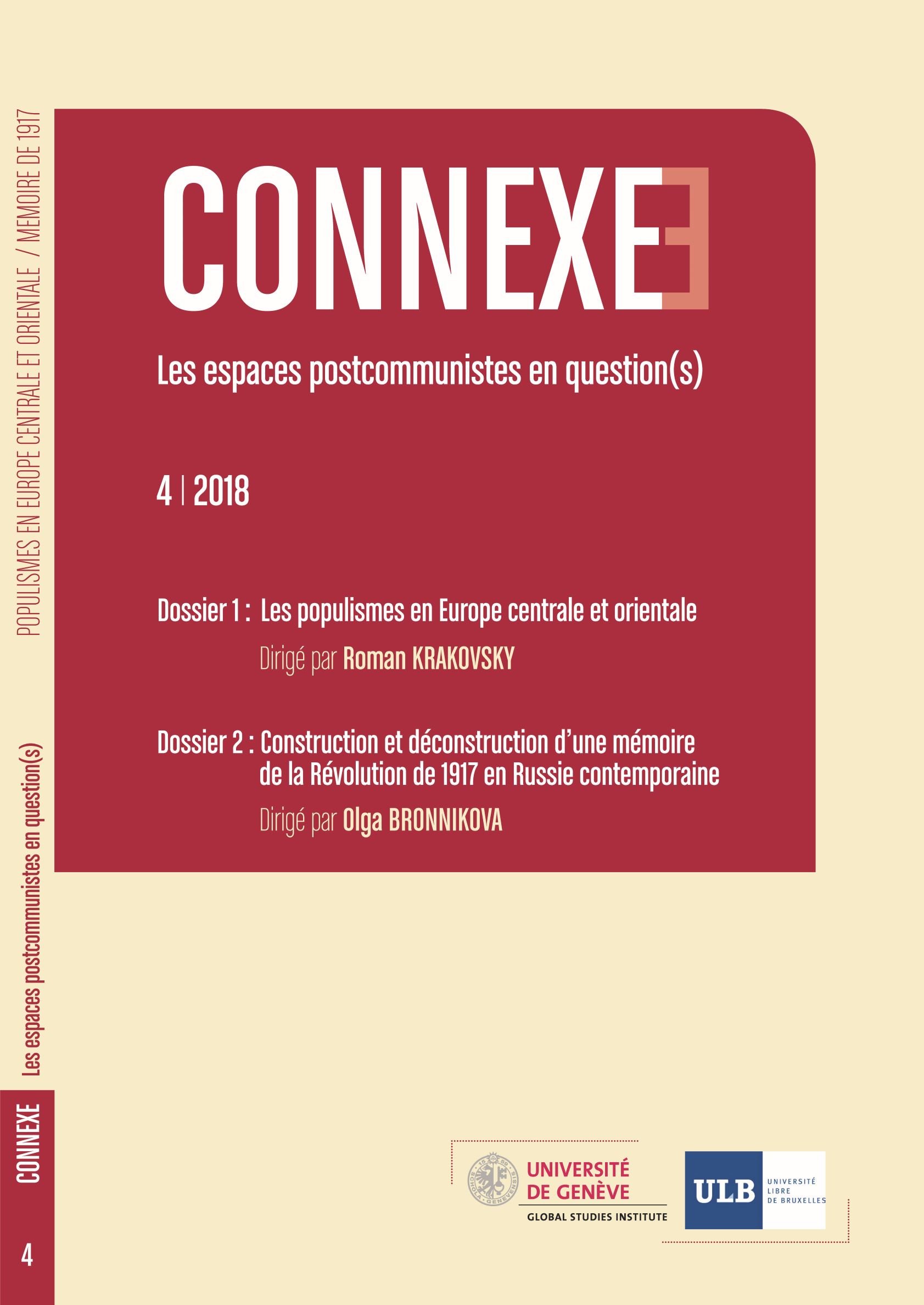Ceaușescu’s National-Communist Populist Turn of the 1970s: A Failed Charisma?
DOI:
https://doi.org/10.5077/journals/connexe.2018.e163Keywords:
populism, Romania, charism, communism, Nicolae CeaușescuAbstract
Ceaușescu’s name is linked to his Promethean attempt to secure Romania’s independence from the Soviet tutelary power and to build a modern industrial state out of the agricultural and industrial Romania modernised during the 1950s following the Stalinist model. This international and social challenge was implemented through the mobilisation of nationalist ideology and the strengthening of the relation between the leader and his people. To attract the masses, Ceaușescu’s charisma did not refer to any objective and inner quality of the leader but to his capacity to embody and manipulate the aspirations of large part of society thanks to a vast housing and industrialization program and a call to nationalism. Even if this populist policy eventually failed in 1989, it consolidated the regime for almost 30 years.
References
Anton Mioara, Ceauşescu şi poporul ! Scrisori către “iubitul conducător” (1965-1989) [“Ceauşescu and the people!” Letters towards the “beloved leader”], Târgovişte: Ed. Cetatea de Scaun, 2016.
Ban Cornel, “Viscous, overproduced, yet still relevant: ‘identity’ in the world of nationalism and state collapse”, in Ioana Bot and Adrian Tudurachi (eds): Identité nationale : réalité, histoire, litérature, Bucharest: Institutul cultural român. 2008, pp. 7-41.
Berindei Mihnea, Dobrincu Dorin, Goşu Armand, Istoria comunismului din România, vol. II, Documente Nicolae Ceauşescu (1965-1971), Bucharest: Polirom, 2012.
Betea Lavinia, Alexandru Bârlădeanu despre Dej, Ceauşescu şi Iliescu. Convorbiri, Bucharest: Editura Evenimentul Românesc, 1997.
Boia Lucian, Istorie și mit în conștiința românească, Bucarest: Humanitas, 2017.
Ceauşescu Nicolae, România pe drumul desăvârşirii construcţiei socialiste, iulie 1965-septembrie 1966 [Romania on the road to the completion of the socialist construction, July 1965-September 1966], Bucharest: Ed Politică, 1968.
Ceauşescu Nicolae, România pe drumul construirii societății socialiste multilateral dezvoltate. Rapoarte, cuvîntări, articole. Iulie 1970-mai 1971. Vol. 5, Bucarest: Editura politică, 1971.
Cioroianu Adrian, Ce Ceaușescu qui hante les Roumains. Le mythe, les représentations et le culte du Dirigeant dans la Roumanie contemporaine, Bucarest: Curtea veche, 2005.
“Declaration regarding the Position of the Romanian Workers’ Party in International Communist and Worker Problems», Scînteia, April 24, 1964.
Dragomir Elena, Cold War Perceptions: Romania’s Policy Change Towards the Soviet Union, 1960- 1964, Newcastle upon Tyne: Cambridge Scholars Publishing, 2015.
Durandin Catherine, Nicolae Ceauşescu. Vérités et mensonges d’un roi communiste, Paris: Albin Michel, 1990.
Durandin Catherine, “À la poursuite de l’histoire en Roumanie depuis 1989”, Vingtième Siècle, revue d’histoire, n° 36, 1992, pp. 61-70.
Durandin Catherine, Histoire des Roumains, Paris: Fayard, 1995.
Gentile Emilio, Les Religions de la politique. Entre démocraties et totalitarismes, Paris: Seuil, 2005.
Gillette Aaron,Turda Marius, Latin Eugenics in Comparative Perspective, London: Bloomsbury Academic, 2014.
Gridan Irina, “Du communisme national au national-communisme. Réactions à la soviétisation dans la Roumanie des années 1960”, Vingtième Siècle. Revue d’histoire, n° 109, 2011, pp. 113-127.
Ioanid Radu, Răscumpărarea evreilor. Istoria acordurilor secrete dintre România şi Israel [The Buyout of the Jews. The history of secret agreements between Romania and Israel], Iaşi: Ed. Polirom, 2005.
Iordachi Constantin, Charisma, Politics and Violence: The Legion of the ‘Archangel Michael’in Inter- war Romania, Trondheim: Program on East European Cultures and Societies, 2004.
Kligman Gail, The Politics of Duplicity. Controlling Reproduction in Ceaușescu’s Romania, Berkeley: University of California Press, 1998.
Kotkin Stephen, Magnetic Mountain. Stalinism as a Civilization, Berkeley: University of California Press, 1997.
Laignel-Lavastine Alexandra, Filozofie şi naţionalism : paradoxul Noica [Philosophie et nationalisme : le paradoxe Noica], Bucarest: Humanitas, 1998.
Marin Manuela, Nicolae Ceaușescu, omul și cultul, Târgoviște: Ed. Cetatea de Scaun, 2016. Murgescu Bogdan, Istorie românească – istorie universală, 600–1800 [Romanian History – Universal History, 600-1800], Bucharest: Universitas, 1999.
Nora Pierre, Les Lieux de mémoire, Paris: Gallimard, 1997.
Ornea Zigu, Poporanismul [Poporanism], Bucharest: Editura Minerva, 1971.
Ornea Zigu, Sămănătorismul [Semanatorism], Bucharest: Editura Minerva, 1971.
Sandu Traian, Un fascisme roumain. Histoire de la Garde de fer, Paris: Perrin, 2014.
Soulet Jean-François, Histoire comparée des États communistes de 1945 à nos jours, Paris: Armand Colin, 1996.
Statutele Partidului Comunist Român [Statutes of the Communist Party of Romania],Bucharest: Editura politică, 1965.
Taguieff Pierre-André, L’illusion populiste. Essai sur les démagogies de l’âge démocratique, Paris: Flammarion, 2007.
Tismăneanu Vladimir, Stalinism for All Seasons. A Political History of Romanian Communism, Berkeley: University of California Press, 2003.
Tudor-Pavelescu Alina, “Le Conducător, le Parti et le peuple, le discours nationaliste comme discours de légitimation dans la Roumanie de Ceauşescu (1965-1989)”, PhD Thesis defended at Sciences Po Paris, February 10, 2009, http://ecoledoctorale.sciences-po.fr/theses/theses_en_ligne/a_tudor_scpo_2009/a_tudor.pdf
Verdery Katherine, National Ideology under Socialism. Identity and Cultural Politics in Ceauşescu’s Romania, Los Angeles: University California Press, 1995.
Weber Max, Économie et société. Vol. 1. Les catégories de la sociologie, Paris: Librairie Plon, 1995.
Werth Nicolas, “Le stalinisme au pouvoir. Mise en perspective historiographique”, Vingtième siècle. Revue d’histoire, 2001, n° 69, pp. 125-135.




